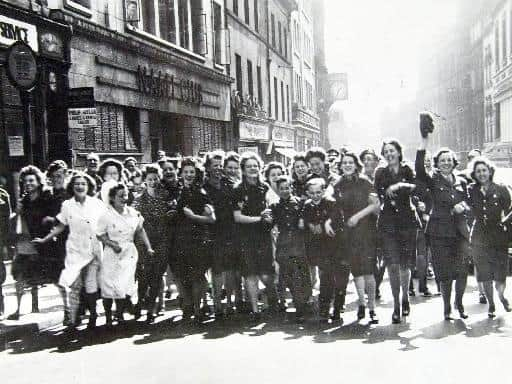VE Day celebrations in Leeds after city's key role in World War Two
and live on Freeview channel 276
Ahead of the 75th anniversary of VE Day on Friday May 8, the YEP has been looking back at the contribution Leeds made during World War Two and the impact the conflict had on the city and it's residents.
On May 8 1945, the people of Leeds took to the streets to celebrate VE Day after schools closed and workers were given a holiday.
Advertisement
Hide AdAdvertisement
Hide AdStreet parties were held and five days later, on May 13, more than 2,000 people took part in a victory parade in Leeds city centre as normality began to return.


Leeds historian Dr Kevin Grady said the city's industry made a vital contribution to the winning of World War Two.
Engineering factories across Leeds produced weapons, aircraft and ammunition and tailoring companies worked tirelessly to clothe the armed forces.
Burton's made more than 13 million garments - a quarter of all uniforms used by the army, navy and air force during the conflict.
Advertisement
Hide AdAdvertisement
Hide AdA total of 100,000 men and 10,000 women from Leeds registered for military service during the war.
As troops went to fight, more than 16,000 air raid shelters were erected in Leeds and more than 18,000 children were evacuated.
Leeds escaped the worst of the German wartime bombing raids.
A total of 77 people were killed in Leeds and 327 injured during nine bombing raids, which destroyed 197 buildings and damaged a further 7,623.
Advertisement
Hide AdAdvertisement
Hide AdDr Grady said German bombers mainly targeted metal works at Kirkstall Forge and heavy engineering factories in Hunslet and Holbeck.
In Dr Grady's 1994 book The Illustrated History of Leeds, which he co-authored with Steven Burt, he described some of the air raids.
Dr Grady said the most violent assault came one night in March 1941 when incendiary bombs hit the city centre and areas of north and east Leeds.
It was followed by high explosive bombs, which struck Leeds General Infirmary, Leeds Town Hall, the City Museum, Kirkgate Market, St Peter's School, Park Square and Quarry Hill flats.
Advertisement
Hide AdAdvertisement
Hide AdIn August 1942, five workers were killed when Kirkstall Forge was bombed.
John Fowler's on Hunslet Road, Hunslet, - where Costco now stands - worked day and night for nearly six years producing more than 1,500 armoured vehicles, including tanks.
The Fairbairn Lawson Combe Barbour factory, off Wellington Street, produced millions of shells and fuses as well as gun and mortar barrels.
The Barnbow factory at Crossgates made thousands of artillery guns, including 15 pounders.
Advertisement
Hide AdAdvertisement
Hide AdDr Grady said Leeds was responsible for the manufacture of 5,000 military aircraft, including bombers.
The two main aircraft manufacturers were the Avro factory at Yeadon and Robert Blackburn's factory on Roundhay Road, which made aircraft including The Swordfish.
Montague Burton's factory on Hudson Road in Harehills - the largest clothing factory in the world at the time - manufactured more than 13 million high quality garments.
Burton's made a quarter of all uniforms used by the army, navy and airforce during the war.
Advertisement
Hide AdAdvertisement
Hide AdIn 1939, Burton's employed 10,500 workers at its Hudson Road factory and 6,000 more in Lancashire.
The employees and management of Burton's bought a Spitfire known as the 'Montague Bee' which was operational with a Polish squadron.
The city of Leeds adopted the Ark Royal aircraft carrier, which was sunk by a torpedo in 1941.
And in 1942 the people of Leeds raised £9m in just one week to help build the replacement Ark Royal.
Advertisement
Hide AdAdvertisement
Hide AdDr Grady said: "The major contribution Leeds made was the products it manufactured for the war effort.
"Leeds came through the Second World War comparatively unscathed compared with cities like Sheffield, Hull and Coventry. We didn't have huge reconstruction to do due to bomb damage
"After the war, it was relatively back to business as usual as the city hadn't been badly damaged by the enemy action
"The infrastructure of the city had become run down, but Leeds gradually came back to life and there was virtually full employment."